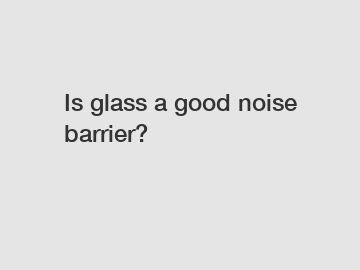Dec. 15, 2023
Energy
Is Glass a Good Noise Barrier?
Glass is a commonly used material in various architectural applications, often admired for its transparency and aesthetic appeal. However, when it comes to noise reduction, many people wonder if glass can serve as an effective barrier. Can it really help block out unwanted sounds and create a peaceful environment? In this article, we will explore this question and examine the effectiveness of glass as a noise barrier.
1. Understanding Noise Transmission:

To evaluate the potential of glass as a noise barrier, it is crucial to comprehend how sound travels. Sound waves can be transmitted through various mediums, including air, water, and solid materials. When sound encounters an obstacle, such as glass, it can either be transmitted (pass through), reflected (bounce back), or absorbed (dissipated by the material).
2. Factors Influencing Noise Reduction:
When considering glass as a noise barrier, several factors come into play:
A. Thickness: Thicker glass tends to provide better noise reduction as it can absorb or block more sound waves. Double-layered or laminated glass, which consists of two or more glass panes with an interlayer, is often more effective than single-layer glass.
B. Density: The density of glass can impact its sound insulation properties. Higher density glass tends to block sound more effectively than lower density options.
C. Air Gaps: Introducing an air gap between glass panes can significantly improve sound insulation capabilities. The space between the panes acts as an additional barrier to reduce noise transmission.
D. Sealing: Proper sealing of the glass panels is crucial to prevent any gaps and maintain an airtight enclosure. Even the smallest gaps or cracks can compromise the effectiveness of the glass barrier.
3. Glass Types and Noise Reduction:
Further reading:Different types of glass offer varying degrees of noise reduction capabilities. Some options worth considering include:
A. Laminated Glass: Laminated glass consists of two or more glass layers with an interlayer usually made of polyvinyl butyral (PVB). This configuration helps to dissipate sound energy and offers better noise reduction than standard glass.
B. Acoustic Glass: Acoustic glass is specifically designed to minimize noise transmission. It incorporates a special interlayer that enhances noise reduction properties, making it an excellent choice for locations with high noise levels.
C. Insulated Glass Units (IGUs): IGUs consist of multiple glass panes with sealed air gaps in between. This design provides effective noise reduction by trapping sound energy and preventing its transmission.
4. Limitations and Considerations:
While glass can be a viable noise barrier, it is important to acknowledge its limitations and consider other factors that may impact its effectiveness:
A. Frequency Range: Glass, no matter how well designed, may have limitations in blocking certain frequency ranges. Low-frequency noises, such as traffic rumble or construction sounds, can be more challenging to attenuate compared to higher frequency sounds.
B. Supplementary Measures: In some cases, combining glass with other noise reduction strategies can yield better results. For instance, using thick curtains along with glass windows can provide an additional layer of insulation to reduce noise infiltration.
C. Comprehensive Design: Effective noise reduction requires a holistic approach to building design, considering factors like wall construction, insulation materials, and window placement. Glass, on its own, may not achieve the desired noise reduction unless other elements are properly addressed.
5. Conclusion:
In conclusion, glass can indeed serve as a good noise barrier when chosen and implemented appropriately. Thicker glass, laminated glass, acoustic glass, and insulated glass units are all examples of effective options that can help reduce noise transmission. However, it is essential to consider factors such as glass thickness, density, air gaps, and sealing to maximize noise reduction. Additionally, it is important to remember that noise reduction is a complex process and requires a comprehensive approach that considers other aspects of building design. By understanding these factors and making informed choices, it is possible to create a quieter and more peaceful environment using glass as a noise barrier.
For more BIPV, bipv solar panels price, what is bipvinformation, please contact us. We will provide professional answers.
Further reading:Previous: What are 5 positive effects of electricity?
Next: Senergytec: Which Innovative Energy Solution Will Dominate?
Related Articles
If you are interested in sending in a Guest Blogger Submission,welcome to write for us!
All Comments ( 0 )